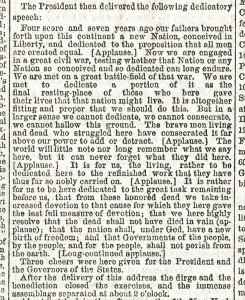The Gettysburg Address
On the 150th anniversary of President Abraham Lincoln’s address at the dedication of the Soldiers’ National Cemetery in Gettysburg, Pennsylvania, the Chapin Library is proud to have in its collections, and in current use by students in both Professor Spero’s History 252 and Professor Dew’s History 456, the printing of the Gettysburg Address as it appeared in the New York Semi-Weekly Tribune of November 20, 1863.
Lincoln’s text, shown here (click image to enlarge), is all but lost in a densely printed, six-columns-wide newspaper (of a size larger than those printed today), following on the featured oration by Edward Everett of Massachusetts, former congressman, senator, governor, and U.S. Secretary of State. Everett was a renowned American orator; he was expected to deliver a glorious address at Gettysburg, and by all accounts he did not disappoint. The length of his speech, more than 13,000 words, was of little or no consequence to an audience of his day, while its content – not only describing the recent battle which had helped to turn the tide of the Civil War, but expressing hope for reconciliation between the divided states – was of great moment to an audience emotionally invested in the event, with its significant losses, and still only midway through the larger conflict.
In contrast to Everett’s much longer and more complex speech, and despite the president’s assertion that the world would “little note, nor long remember, what we say here”, Lincoln’s remarks have been well remembered, even memorized by generations of students. Their brevity has proved an advantage – but a brevity made possible at the time only because Everett had already done the heavy oratorical lifting, and a quality which has come to be preferred in an age unused to public addresses in too long a form. Writing to a gentleman in South Carolina in 1879, in a letter also in the Chapin Library, Oliver Wendell Holmes noted that Edward Everett had, on November 19, 1863, “delivered a patriotic and eloquent oration. But the few simple words of Abraham Lincoln went to the heart of the Northern people as no elaborate rhetoric ever could.” Even Everett himself gave due credit to the president; after the ceremony, he wrote: “I should be glad if I could flatter myself that I came as near to the central idea of the occasion, in two hours, as you did in two minutes.”
The Tribune printing of Lincoln’s address shows that, although today it is read straight through with great solemnity, on November 19, 1863 it was interrupted six times by applause. – WGH
The newspaper was purchased by the Chapin Library on the Class of 1940 Americana Fund. The autograph letter by Oliver Wendell Holmes to F. Peyre Porcher, M.D. of Charleston, in which Holmes wrote out the text of Lincoln’s Gettysburg address, was given by J. Brooks Hoffman, M.D., Williams Class of 1940.
